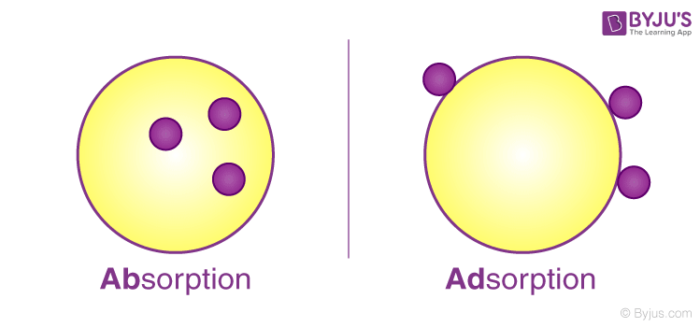What is Adsorption?
When a solid surface is brought in contact with a gas or liquid, molecules from the gas or liquid starts to collect at the surface of the solid. This phenomenon of a collection of gas or liquid molecules on the surface of the solid is known as adsorption. A substance which accumulates on the solid surface is known as adsorbate and the solid surface on which it occurs is known as an adsorbent.

Factors affecting the extent of adsorption
The extent to which adsorption will happen on a solid surface depends on the following factors:
Nature of adsorbent
The adsorption of the gas depends on the nature of the adsorbent. A gas can be adsorbed on different absorbent surfaces in different amounts. For example, Hydrogen is weakly adsorbed on the alumina surface whereas it is strongly adsorbed on the nickel surface under certain conditions.
Surface area
When we increase the surface area of the adsorbent there is an increase in the adsorption of gases. This is because when we increase the surface area there is more number of adsorbing sites. So finely divided solids and some porous substances are good adsorbents.
Nature of the gas
In general, if a gas is more liquefiable it will be more easily absorbed. For example, gases like NH3, HCl, Cl2, CO2, which can be liquefied easily are more readily adsorbed on the solids surface rather than permanent gases like O2, H2, etc.
Exothermic nature
The heat of adsorption can be defined as the energy liberated when 1 g mol of a gas is adsorbed on a solid surface. When the temperature is increased the kinetic energy of the gas molecules also increases which results in more number of collisions between the molecules and the surface.
Pressure
On the solid surface, there is a fixed number of adsorption sites where gas molecules can be adsorbed. Initially when the pressure has increased the rate of adsorption increases due to an increase in the gas molecules striking on the surface. Thus, an increase in the pressure increases the rate of adsorption linearly. But after sometime, it will reach a point when the pressure has no effect on the rate of adsorption as the number of adsorption sites is fixed and no more adsorption can happen in those sites. Hence, at that point, the extent of adsorption will be independent of the pressure.
This was just a brief layout about the factors affecting the adsorption of gases on a solid surface. To know more about the adsorption and have deep knowledge in surface chemistry, please visit BYJU’S.

Comments